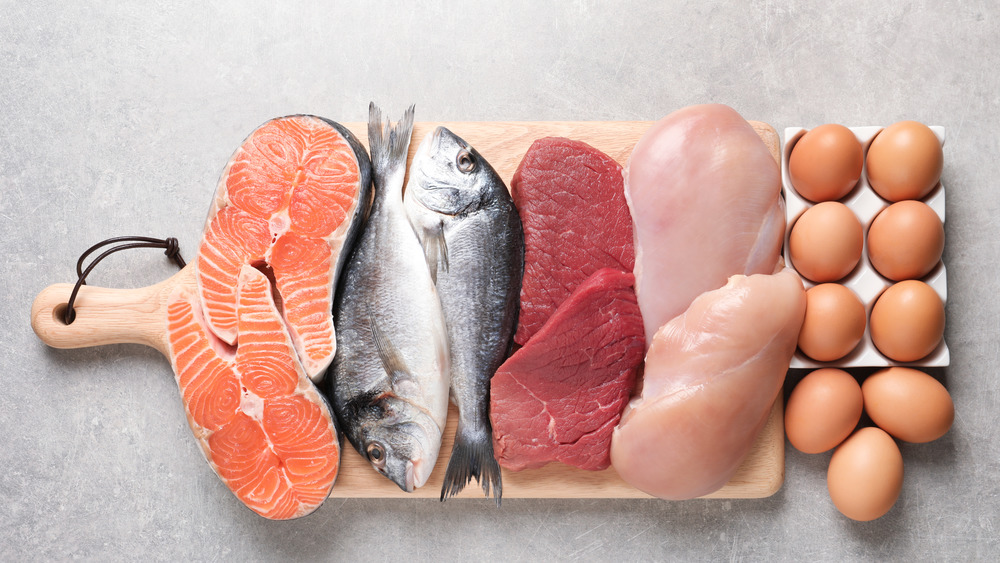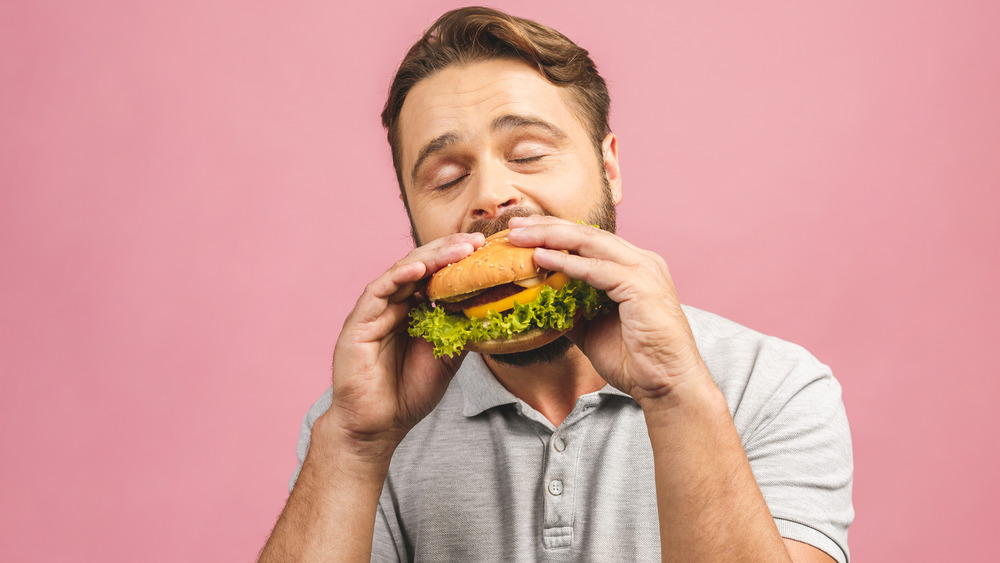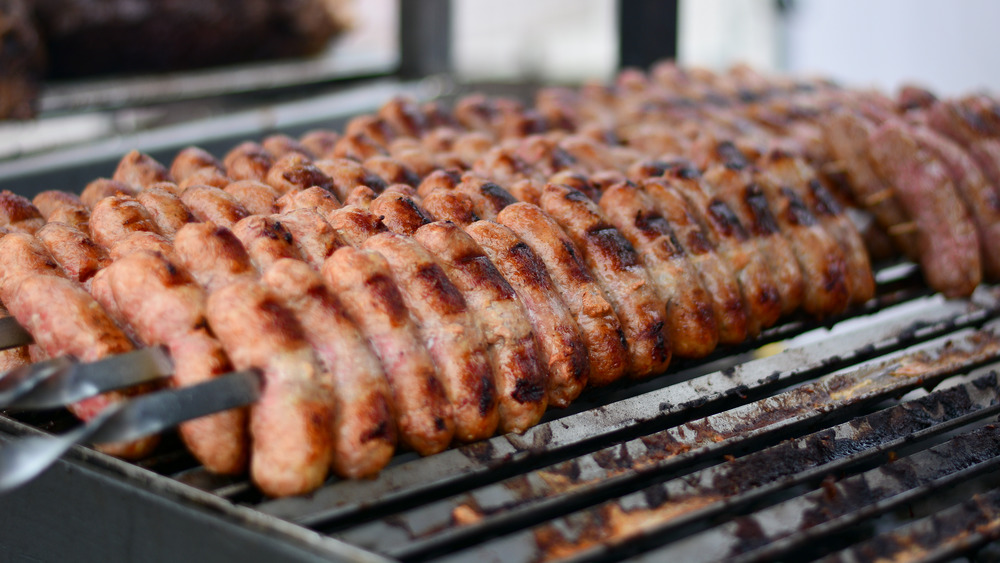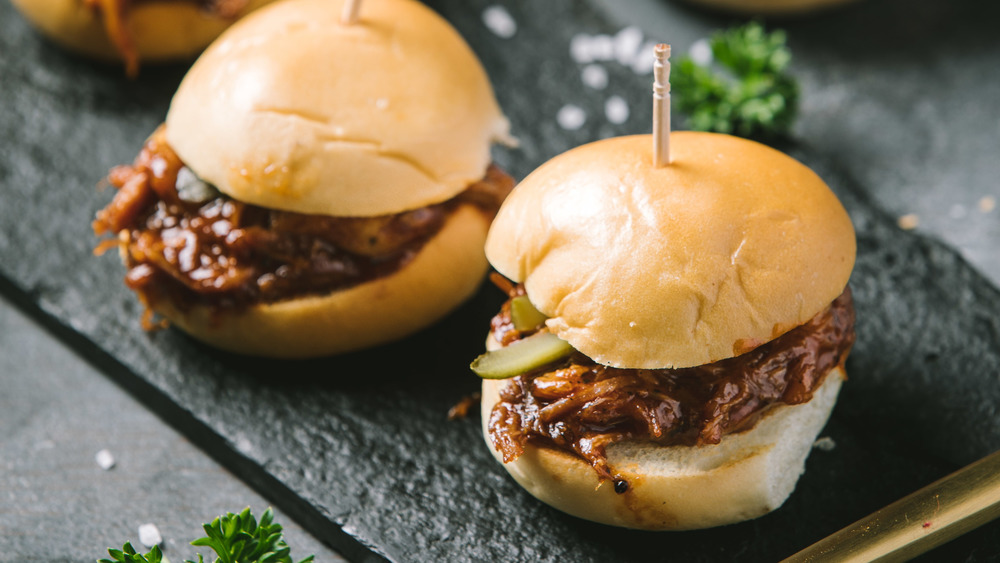When You Eat Lots Of Protein Every Day, This Happens To Your Body
Diet trends come and go. It seems like only a few decades ago we were told to shun fat in all its forms, but then, boom! Low fat was out, low carb was in, and now it's cool to shovel in lard with a spoon as long as you don't let a crumb of bread pass your lips. And yet, man – and woman – cannot live by lard alone (thank goodness!), so the low-carb diets tend to be focused around protein. Eggs for breakfast, protein shakes for lunch, steak for dinner, and a midnight snack of beef jerky. All protein, all the time. Can this really be good for us? Or is it possible to get too much of a good thing?
To get some answers to this dietary dilemma, we turned to Heidi Skolnik MS, CDN, FACSM, who works as the nutrition consultant for protein drink company Protein2o, makers of protein-enhanced water (yes, that's now a thing). She also advises students at The Juilliard School of performing arts on performance nutrition (not cool to keel over during an oboe recital, after all), and has done so for various sports figures and actors, so yes, she's a recognized nutrition expert who knows her protein. Lucky for us, she took some time out of her busy schedule to answer a few questions we had about the effects of protein on our bodies, and just how much of the stuff we should be eating.
Protein is not an option
Skolnik confirms what we all know to be true – protein is an extremely important part of our diets and is something we need to eat a sufficient amount of every single day. She points out, though, that it is especially important these days to eat enough protein since "protein [plays a] role in supporting our immune system," explaining that it "helps the body build muscle and repair tissue while also helping with digestion and regulating hormones." Other ways in which protein can be beneficial to our health is by providing energy and helping us to feel full after eating, something that, say, lettuce on its own just won't do.
According to Skolnik, many of us are failing to get enough protein in our diets on a daily basis, particularly when it comes to what we eat at breakfast and what types of snacks we choose. She advises "look for easy ways to add protein to your diet if you aren't currently consuming enough," so maybe that beef jerky wouldn't be such a bad idea.
What protein actually does for our bodies
"Protein," says Skolnik, "is essential for life and participates in almost every process of a cell." As she tells us, our bodies need protein to not only build but also to repair our cells and tissues. While everyone knows that protein builds strong muscles, it seems that our bones also require this substance, and even our nails and our hair rely on protein. Skolnik warns that "lack of protein can result in brittle or thinning hair, and dry and flaky skin," not to mention the far worse condition of being susceptible to illness and even becoming anemic.
Without sufficient protein, we're also likely to feel fatigued and our bodies will have a hard time healing any minor (or major) wounds we may receive, Skolnik even says that low levels of protein can affect the neurotransmitters in our brains, something which can impact our mood (and not in a good way).
How much protein you should be eating
Okay, okay, we get it – we need to eat enough protein. But how much is enough? All this dieting math can get so confusing! Skolnik says that there is no one perfect one size fits all amount of protein that everybody should eat, since the specific amount each one of us needs depends on how old we are, our gender, our body weight, how active we are, and the general state of our health. "An athlete," she says, "may need to consume more protein than the average recommendation," adding that "as we age, we may need more protein," as well. She also points out that vegans may need to consume more protein, probably due to the fact that many of the nutrients they take in are less bioavailable than are ones from animal sources.
In order to figure out the amount of protein that's just right for you, Skolnik suggests using one of the many apps and websites meant to help calculate nutritional requirements based on the data you input. She gives, as an example, the Interactive Dietary Reference Intakes Calculator provided by the USDA.
What can happen if you eat too much protein
As Skolnik says, "it's always important to pay attention to the type of protein consumed, along with the amount." Just because something is protein-packed, doesn't necessarily mean it's all that good for you – smoked and processed meats may contain harmful nitrates, and various other high protein foods may be high in other unwanted ingredients such as non-healthy fats and sodium.
Even if you are eating lean, non-processed proteins, however, Skolnik warns that "overconsumption, in time, can be harmful and lead to health complications," nothing that some of its less-desirable complications might include "bad breath, constipation, diarrhea, dehydration, weight gain, and perhaps kidney issues." She also mentions that excess protein may be stored as fat if not used as an energy source, but also tells us that "the body metabolizes the excess protein and it becomes very expensive pee." So there you have it, right from the expert's mouth – be sure to eat enough protein every day, but not too much, since who wants pricey piss?




